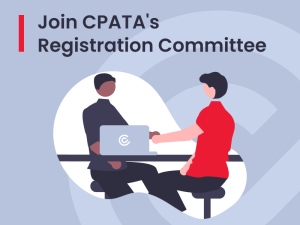CPATA retains outside legal service providers (LSPs) to support regulatory activities including investigations, expert evidence and opinions, licensing and credentials matters, and discipline prosecutions, and to act for the College primarily before the Federal Court. CPATA retains LSPs who have experience in civil litigation, administrative law, regulatory law, intellectual property law and other specialized areas of practice. LSPs are also retained to assist with registration and licensing matters, as well as legislative and policy development.
As a national professional regulator, CPATA operates in both official languages, and in a fully digital environment. CPATA is committed to principles of equity, diversity and inclusion in all its operations, programs and services while acting in the public interest. CPATA therefore welcomes expressions of interest from qualified practitioners from equity-seeking communities.
CPATA is always interested in receiving expressions of interest in future retainers from LSPs who satisfy the criteria shown below.
If you are interested, please submit a CV and a covering letter explaining how your qualifications meet the criteria. We will also require at least two relevant professional references.
All practitioners who have expressed an interest in acting for the College will have their information kept on file for three (3) years, after which they must re-apply.
CPATA makes no commitment to retain anyone who has submitted an expression of interest, whether or not that individual satisfies the criteria, nor is the College restricted to the list of those who have submitted expressions of interest when determining whom to retain for specific matters.
Please email your covering letter and CV to Juda Strawczynski, CEO and Registrar, College of Patent Agents and Trademark Agents, at ceo-dir@cpata-cabamc.ca.
Criteria for Use of Outside Legal Service Providers
Why are Outside Legal Service Providers Retained?
CPATA occasionally retains outside LSPs to support its regulatory activities, including investigations, opinions, and representation relating to registration, licensing, complaints and discipline matters, and to act for the College before the Courts, including the Federal Court, where special expertise is required.
Outside LSPs may be retained:
- When an Application is made by the Investigations Committee to the Discipline Committee
- When the Registration Committee considers matters of good character, fitness to practice or other licensing matters including reviews of Registrar decisions
- When a conflict or potential conflict prevents CPATA staff or consultants from working on a matter
- When specific expertise is needed that does not exist in-house
- When CPATA requires an expert legal opinion
- To prosecute or seek injunctions relating to matters alleging unauthorized practice
- To respond to or initiate legal proceedings on behalf of the College; e.g. applications for judicial review, obtaining warrants or orders from Federal Court
- To draft or review and advise on the contents of a contract
- To assist with research and drafting of legislation, by-laws and policies
- To conduct investigations under direction from the Investigations Committee
General Principles for selection of outside legal service providers
The following considerations will influence the selection of outside legal service providers:
- LSPs must be skilled, experienced, trustworthy, reputable, fair, objective, and culturally competent individuals capable of appropriately representing the College’s interests
- In most cases, LSPs will have specific experience with the kind of matters for which they are retained, familiarity with the role and structure of CPATA as a regulatory body, and knowledgeable of general administrative law principles
- LSPs must be familiar with the CPATA Act, and, where necessary in some cases, the Patent Act and/or Trademarks Act
- LSPs will consider geographic location, diversity of legal service provider types and the ability to offer services in both official languages
- LSPs will be selected from firms that operate in a manner consistent with the College’s commitment to equity, diversity and inclusion
- LSPs must be a member in good standing with their respective legal regulator(s)
- LSPs retained to act for the College must not be the subject of discipline proceedings or have prior discipline histories with their respective regulator(s)
- LSPs must demonstrate an ability to complete legal services in as efficient, cost-effective, competent and ethical a manner as possible, and agree to regular performance monitoring by the College to ensure compliance
Choice of Outside Legal Service Providers
In addition to the General Principles above, the choice of a particular LSP may be determined by:
- Urgency – is the matter of an urgent nature, requiring a LSP who is able to respond on short notice?
- Experience – does the matter require a LSP with demonstrated experience in the particular type of matter?
- Geography – does the matter necessarily lend itself to someone in a particular area of the country?
- Official Languages – does the matter require proficiency in one or both official languages?
- Systems – is the matter complex, or may it require LSPs with firm staff and other support and practice management systems, including associates or partners with knowledge of other areas of law, to ensure competency and cost-effectiveness in carrying out the retainer?
- Length of commitment – is the matter likely to be resolved or completed within a shorter time frame, or might it require a significant time commitment?






